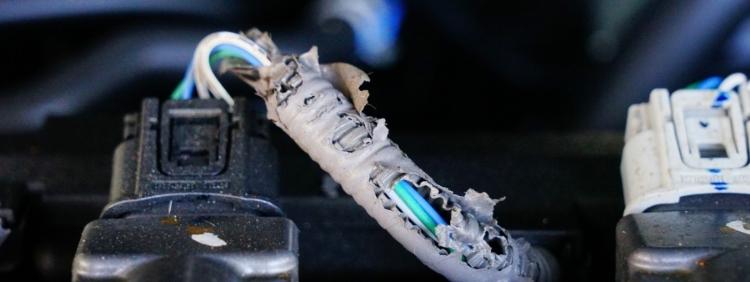Will Rodents Chew Your Car Wiring?

When most people think about rodent control, they think about protecting their homes or outdoor structures from infestations. Most people do not think about protecting their vehicles.
Rodents can and will access your vehicle, especially if they feel it provides a safe nesting site or access to food and water. You need to take preventative actions to protect your car from mice and rats because if you don’t, the animals can cause extensive and expensive damage to your vehicle.
Do Rodents Chew Car Wiring?
Rodents can and likely will chew through car wiring and other materials. Mice and rats have teeth that continually grow. To ensure their teeth do not extend through their mouths and impede their ability to eat, the animals must gnaw on materials to shave or file down their chompers.
Unfortunately, the animals do not discriminate between less costly chewables and more expensive options. You will likely find seat cushions chewed through, wires frayed, holes in plastic components, and so much more.
Aside from needing to gnaw to file down their teeth, rats and mice will chew to find materials for their nests, such as the foam from your seat cushions or the carpeting from your floors.
Still, the most vital issue is that mice and rats will chew through wiring. Depending on which wires the animal decides to chew, the car could be rendered useless with extensive electrical repairs.
How Do They Access Your Car?
Mice can enter your vehicle through the engine compartment. Most mice use the compartment to access the airbox, a preferred nesting site. Additionally, the rodent can find its way into your vehicle’s interior from inside the compartment. It may use vents or even holes intended for wires. A mouse can fit through an opening the width of a pencil, so access is not a problem.
How Can You Prevent Access To Your Vehicle?
There is no surefire way to eliminate access to your vehicle. A determined mouse will find a way if given time and the opportunity. Your objective is to restrict the available opportunities. With planning and routine, it is possible to make a vehicle unappealing.
1. Remove Food Sources
If you have a bad habit of storing food in your vehicle, now is the time to stop. Rodents have an incredible sense of smell. Open granola wrappers, leftover fast-food fries, etc., are all enticements to a hungry mouse.
Food motivates wildlife. If they sense something delicious is inside your vehicle, the animals will follow the path of least resistance to access it. The best thing you can do is make sure there is no food or crumbs in the car. Make it a habit to remove all garbage and vacuum your vehicle.
2. Keep Debris Away From Your Car
Mice want shelter. If you do not drive your car that often and allow leaves or other debris to buildup around it, you are providing a safe place for mice. Therefore, make sure that if you park outside, all leaves and debris are swept up or blown away from the vehicle’s underside.
3. Park in a Garage
The best way to protect your vehicle is to park it inside a garage. Having your car parked in a secured and locked structure reduces the risks of mice or other rodents finding their way inside. However, parking in the garage only protects your vehicle if the garage is also free of mice.
Do you think you have mice or rodents on your property? If so, you might want to invest in four seasons pest control to reduce the likelihood of mice finding their way into your car. Contact Truly Nolen Canada to schedule a property assessment with a qualified technician.